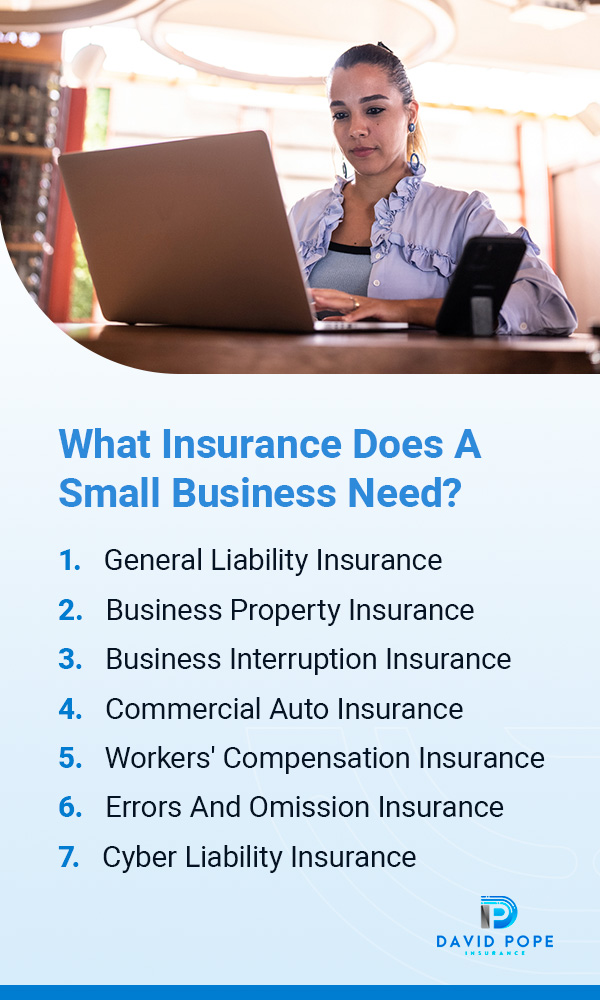
Small businesses need special attention when purchasing insurance coverage. The coverage must be tailored to meet the company’s basic needs and protect its assets and interests against the most common perils. Small business owners may purchase a variety of insurance coverages, including general liability, business property, business interruption, workers’ compensation and more. It’s advisable to select coverage according to your usual operations to reduce your expenses.
Small business insurance protects your business assets, property and income. It includes protection against property damage, injuries, lawsuits, workers’ compensation claims or other losses you may face while operating your business.
Insurance companies offer different insurance coverages depending on the business’s demands. According to the Insurance Information Institute (Triple-I), the most common policy for small businesses is the “Business Owners Policy” or BOP, which combines the major property and liability coverages into one package.
Like small business insurance, commercial insurance protects businesses from losses arising from unexpected events, like natural disasters, accidents and lawsuits. Examples of coverages include property damage, employee-related risks and legal liability. The coverage that companies choose typically depends on the potential risks, which vary from industry to industry. Even within a particular sector, businesses select different insurance coverages depending on the nature of their operations.
The primary difference between small business and commercial insurance is the business size. While small business insurance focuses on small organizations, commercial insurance may apply to medium and large businesses as well. In other words, all small business insurance is commercial insurance but not all commercial insurance is small business insurance.
Insurance coverage may become complex as the business grows, and the level of coverage is generally broader for larger organizations. As a business owner, it’s recommended that you evaluate your insurance needs, taking into account the size of your company.
Request a Small Business Insurance Quote
How does a company determine its size? Consider the following factors when making this assessment.
The number of people employed is essential when determining a company’s size, at least for insurance purposes. Employees may include full- and part-time workers or seasonal employees but generally excludes independent contractors. The number of employees required for a business to qualify as small or large may depend on the agency and industry.
Large businesses typically generate more sales than their smaller counterparts. This reality could be based on several factors, such as the price of specific goods, demand for products and number of customers. Bigger companies usually have more risks than smaller businesses and require more extensive insurance coverage, but the circumstances may change depending on the type of business.
A business’s net profit is an integral factor when determining its size. Small businesses generally have small profits, while large companies make substantial returns. Considering that insurance premiums can affect a business’s profit margin, selecting coverage that matches your spending abilities is crucial.
Market share is the portion of a market that a particular company controls. It’s expressed as a percentage of the total sales or revenue in a market that the business is responsible for. For example, if 50,000 units of product X are sold in a particular year in a specific industry, a company that sold 5,000 units would have a 10% share in that market.
Large businesses usually have higher market shares. Even so, a relatively lower share does not automatically make your business small. The deciding factor is determining how much your business makes compared to the major industry players.

Market capitalization is the value of a business that is traded on the stock market. It is calculated by multiplying the total share amount by the present share price. Market capitalization directly reflects how well the business is doing—a standard measure of its equity value to investors.
Capital or funds employed is the total amount of capital the business uses to acquire profit. It’s typical for large companies to have more capital employed since small businesses generally require less capital to run operations. As the business grows, its capital may expand to meet the demands. This usually translates into higher risks, hence the need for more extensive insurance coverage.
Triple-I provides some helpful insight by organizing businesses into the following categories.
A small shop run by a sole trader and their family may be considered a home-based business. These entities usually have relatively low revenue but still need insurance against risks. However, the level of coverage may differ from other larger organizations. Home-based businesses are essentially small businesses but treated separately because of how they are managed.
Home-based businesses operating as sole proprietors have a higher risk of losing their personal property to liabilities. It’s vital to consult an insurance professional to determine which coverage best suits your operations. For example, in addition to homeowners insurance, you may be advised to get other business-related coverages to protect your assets.
Small businesses have different definitions, but all depend on factors like the number of employees, profit generated and capital employed. Some insurers may consider companies with less than 50 employees small, while others may set the number at 100. Triple-I states that BOPs are usually available to businesses with less than 100 employees and an annual revenue of about $5 million or less. Since BOPs are most common among small businesses, using this benchmark to determine what qualifies as a small business makes sense.
According to Triple-I, businesses with 100 to 1,000 employees and an annual revenue of $10 million to $1 billion may seek insurance as medium-sized businesses. Given the size of the company and its assets, insurers may develop particular policies that combine property and liability coverages to cater to those needs. Small businesses may require less extensive coverage on machinery and equipment as medium-sized companies, and transfer their resources to other areas as a result.
Large businesses may have more than 1,000 employees, but the revenue requirements may depend on the type of business. Organizations often become more complex as they grow, and so do their insurance needs. Such companies may customize insurance coverages to meet their demands.
Unlike small businesses, most large companies employ professionals to evaluate potential risks and recommend preventive measures. These professionals also implement processes to reduce their risks as much as possible. Even so, small businesses may leverage reliable insurance companies to assess their risks and propose coverage.

Small business insurance protects businesses against covered risks. While some entrepreneurs immediately see value in such strategies, others require further education to understand the benefits of purchasing insurance coverage. Here are four reasons why you should insure your business immediately.
As a business owner, you know challenges are inevitable. It’s often impossible to know how or when an incident will occur, or how big it will be. Some of these perils are uncontrollable or difficult to curb. But when they occur, businesses covered may make a claim against the insurance company and use the money to rebuild.
Small businesses can benefit from different coverages, including general and professional liability, cyber liability insurance and equipment insurance. A business must choose coverage based on specific needs. For example, product-based businesses may secure larger coverages for costly tools and machines, while service-oriented companies may focus on professional liability.
Some insurance coverages are mandatory by federal or state law. For example, it’s typical for lenders to require you to produce home insurance if you want a mortgage on your property. Similarly, if you rent a space for your business, your landlord may also require you to list them as additional insured.
Your business type may make it mandatory to sign up for insurance coverage. For example, if your business sells alcohol, you may need to comply with the dram shop laws and have liquor liability insurance. Federal law makes it mandatory for small businesses to have specific insurance coverages, including workers’ compensation, unemployment and disability insurance. If your business has a vehicle, you must purchase commercial auto insurance.
Insurance is a safety net for unexpected events. It provides a buffer for businesses against unplanned expenses, some of which can be fatal. When insured perils occur, you may file a claim with the insurance company instead of paying with your savings. The insurance company takes the burden according to your coverage, which may be enough to pay off the loss. For most businesses, the financial benefits are felt in the long term.
Have Questions? Contact Us Today!
Investors tend to be interested in entrepreneurs that exhibit professionalism—purchasing insurance coverage can help you achieve that. Having insurance informs investors that you know how to protect assets. They feel safer funding your business and forming a long-term relationship with you. The same applies to banks and other lenders because having insurance coverage can give you credibility.

Here are seven types of insurance coverages you should consider for your business.
General or business liability insurance provides broad coverage for small businesses, including property damage and personal injury. If a visitor gets injured or damages their property on your premises due to your negligence, you may file a claim against the insurance company to cover those losses.
You may include copyright infringement or reputational harm in your insurance coverage, depending on your needs. The primary aim is to protect your business against lawsuits, which can drain your financial resources.
Business property insurance protects commercial assets, including buildings, machines, fixtures and inventory. For most small businesses, these assets represent a significant part of their expenses, so replacing them can be challenging. Insuring your business assets against flood, fire and theft lets you recover the whole or part of the loss, depending on the level of coverage.
Business interruption insurance allows the business owner to claim when their business is interrupted by fire, flood, theft or other covered perils. Depending on the terms of the agreement, the coverage may extend to pandemics.
Many small businesses suffered during the pandemic due to a lack of preparedness. While some companies completely shut down, others lost tremendous revenue since they could not operate. That’s why you need the right insurance coverage.
Business interruption or income insurance allows business owners to claim lost earnings and other covered expenses. For example, it can help you pay for a temporary office while you repair your permanent space. It’s important to note that there could be limits on your coverage. Your insurer may have a threshold on the amount you may claim or the duration affected, so make the necessary inquiries before signing the agreement.
Small businesses that own vehicles should have commercial auto insurance, which is typically mandatory. If the employer or employee gets into an accident while driving a work car, van or truck, the coverage may take care of the expenses. Some expenses are often excluded, including:
Workers’ compensation insurance is a requirement for small businesses with employees. It pays for work-related injuries and illnesses and is mandatory in most states. The coverage includes medical care, disability benefits and lost wages. The amount you pay for workers’ compensation insurance depends on the size of your business, the number of employees and the industry.
Small businesses providing professional or advisory services to clients may need errors and omissions or professional liability insurance. The coverage pays for work-related mistakes like when a client claims your service caused them financial distress. If your client successfully proves negligence, misrepresentation or violation of good faith and fair dealing against you, the insurance company may pay the expenses.
Cyberattacks are a concern for businesses of all sizes. Business owners lose large amounts of money every year to malware, ransomware, spyware, viruses and phishing attacks. While some businesses are able to recover immediately, others take time to fix the damage or completely shut down operations.
Cyber liability insurance covers losses due to cyberattacks and data breaches. The insurance company may cover the expenses if a customer files a claim against your business for a data breach. Cyber liability insurance may also cover things like notifying customers impacted by the cyber attack and offering them free credit monitoring.

The type and level of insurance a business needs depends on its size and operations. Small business insurance is designed to help growing businesses protect their assets against covered perils. While the coverage may not be as extensive as a larger company, choosing a package that addresses your basic needs is vital.
David Pope Insurance is a family-owned insurance agency providing tailored solutions to small businesses in Missouri and beyond. We offer a full range of insurance services, including small business and commercial insurance. To learn more about how we can help you protect yourself and your business, request a quote today!